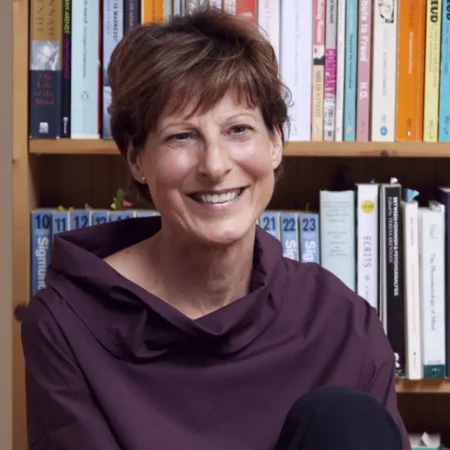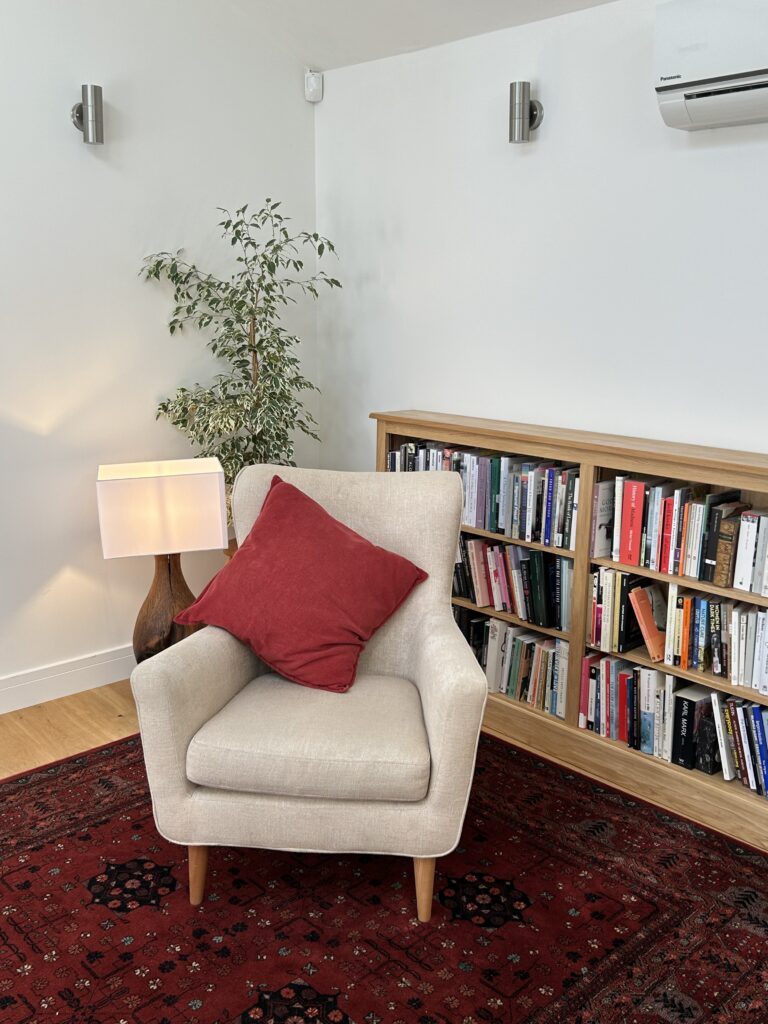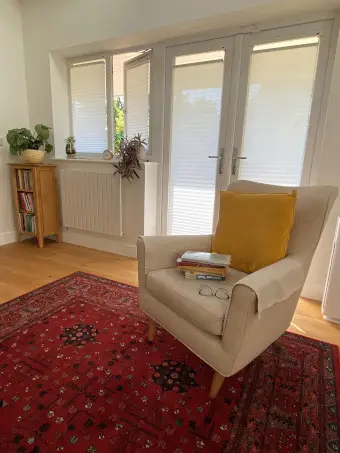
Home
People seek a therapist for many different reasons but usually there is a pressing need to work things out in a way that can’t be done alone. Sometimes the decision is prompted by a change in circumstances such as illness, a difficult relationship, loss. Sometimes people seek help because they feel a general sense of isolation or sadness for which there seems no explanation.
I am a psychoanalytic psychotherapist working from a warm, light consulting room situated just outside Cambridge City centre.


People I help
People who come for help may feel stuck, weighed down by a sense of hopelessness or grief. Sometimes there is a lack of direction or change in an important relationship that makes it impossible to think. Some feel overwhelmed by the relentlessness of the demands being made upon them, some feel detached and dislocated from the world; something may have happened that forces them to reflect on who they are and how they would like to be.
People live composite lives which rarely fall into neat categories, but other reasons help is sought include:
- Stress (family and workplace)
- Bereavement
- Illness
- Burnout
- Loss of creativity
- Forms of abuse
- Gender issues
- Parenthood
- Panic attacks
- Depression and anxie

Training, qualifications and experience
I trained as a psychoanalyst with The Site for Contemporary Psychoanalysis in London. This is a postgraduate training organisation that encourages critical, reflective and imaginative thinking about psychoanalysis and its contemporary practices – in particular how it applies to the way we live in society today. The training and graduates of the programme are registered with the UKCP.
Before and during my training I worked psychotherapeutically in the NHS within multidisciplinary teams. These are professional collaborations of medical, healthcare and social staff who seek to address the emotional, social and physical needs of patients. I have also worked in special and mainstream education and in the charity sector, including Mind, as well as other government-funded multi-agency organisations. Within these settings my patients have been adults, older people, adolescents and children from a broad spectrum of social and cultural backgrounds.



The way I work
I practice in a way that is influenced by contemporary psychoanalytic theories, based on the concept that we not always fully aware of the reasons we hold certain beliefs about our selves and our lives. Identifying and understanding the origins of these beliefs can make it possible to do things differently; you might find that feelings of distress are eased and that you can be more open in your interactions with others and in the ways you spend your time.
Usually I meet with people face-to-face. If you are working away or it is not possible to come in person we might meet over Zoom.

About psychoanalytic psychotherapy
Psychoanalytic psychotherapy is a relationship based on trust where you can talk in your own words about the experiences that impact you now and those that have shaped your past, as well as your desires for the future. A psychoanalytic therapist is trained to listen carefully to what you say and, alongside you, to notice patterns that may emerge in the unique way you relate to the world around you and in your relationships. At the beginning it can be difficult to know where to start; how to order thoughts or articulate what is going on for you. As the sessions unfold you will get used to putting your thoughts into words and hearing them spoken to someone who carefully attends to what you are saying. This in itself can bring relief from internal narratives can feel relentless in their insolubility.
I meet with people who come for psychotherapy on a weekly basis – some more frequently than this – for medium to long term work.



About psychoanalysis
While short-term approaches focus on resolving immediate concerns, psychoanalysts believe that symptoms of disquiet originate from a deeper unrest and that even if they are ‘cured’ symptoms are likely to return, often in an altered form. Psychoanalysis requires a commitment of time, offering you the opportunity to look at your life in more detail to trace the influences that make you who you are today. It is an ongoing conversation and exploration with a person you can trust. As in psychotherapy, it is your speech and your words that matter, with the material and pace set by you.
I meet with people who come for psychoanalysis at least twice a week.

How the sessions work
When you make contact we will arrange an initial meeting. Here you can experience what it is like to talk about aspects of your life, your thoughts, concerns, and feelings. You will have time, following the meeting, to think about whether or not you would like to go ahead with sessions.
If you decide you would like to go ahead we will agree a regular 50 minute session time which will remain the same each week.



Fees
Fees are in the range of £45 – £70 per 50 minute session.
There will be time in the initial meeting to have a conversation about what you can reasonably afford, depending on your circumstances. This meeting lasts 70 minutes and costs £50.
Sessions which are missed, or which you are unable to attend are charged, as this is time I have put aside for you. If I can reschedule a session I will endeavour to do this for you.
Contact
